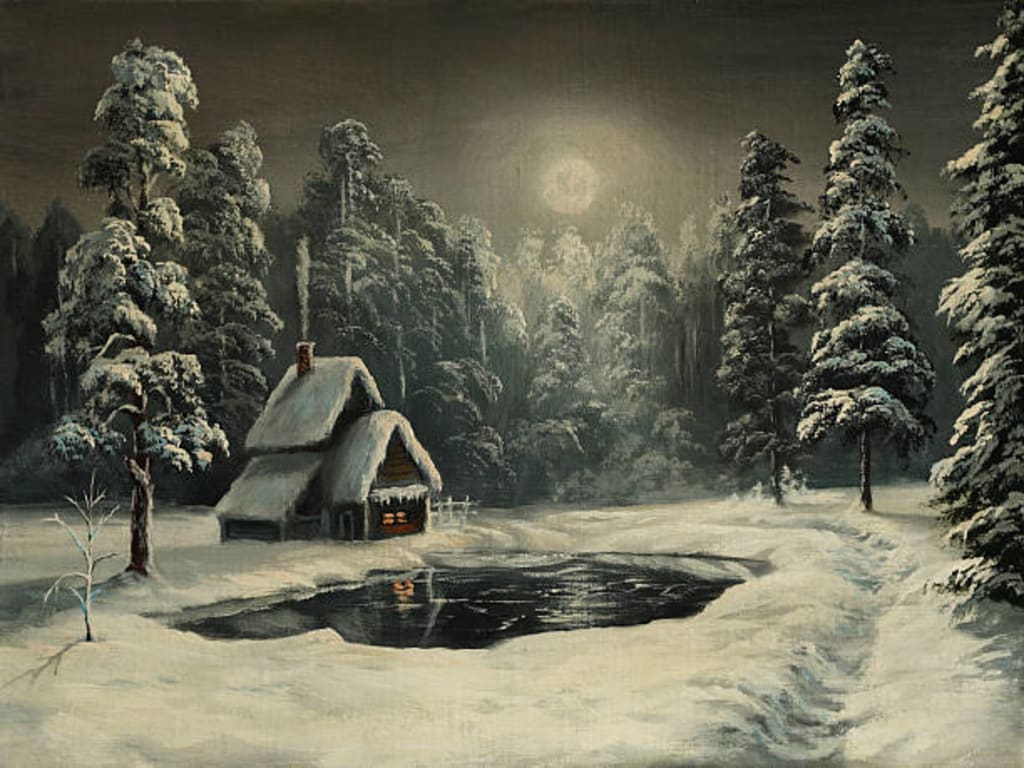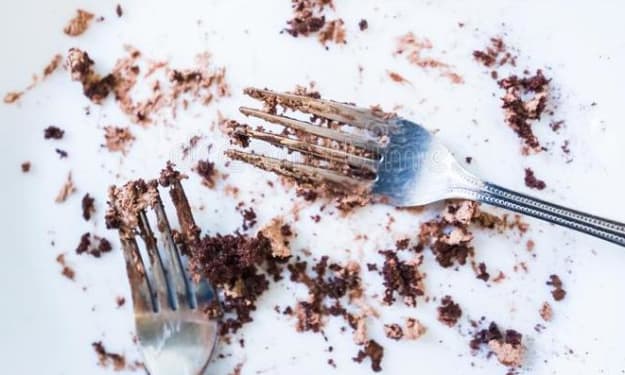
A long time ago (well, not that long, a bit long though- let’s say a while ago). Try that again.
At a certain point in time, at a point in the past, when it happened, so, technically, at the perfect time.
Not doing too well, are we. Reason is, that what happened could have happened yesterday, tomorrow, or not at all. It does happen, more than we think. And in the end, it happens to us all on all, on our deathbeds. But for some (un)fortunate people, it happens while we are still alive.
At the base of a mountain, some time ago, there was a Hut, next to a Pond. The Hut was a hermitage. By Hut, we mean four walls with a thatched roof that leaked pretty badly, with no windows to speak of. By hermitage, we mean a place people went to find answers.
In the Hut, by the Pond, a Woman sat meditating. She heard the birds, the wind through the pines, and smelled the piney smell. But her attention lay somewhere between the Pond, which was frozen at the time and her mind, which was similarly so. Though very cold (the lack of windows), very hungry, and very exhausted, there was no place that she would (or could) rather be. For, as so stumblingly noted above: a perfect time in the past, implies a perfect place in the world. As the woman was beginning to know- all is perfection: even the cold, the hunger, and the exhaustion.
The woman had lived. Had worked in a kitchen, had had relations, with both men and women, had lived life as it was meant to be lived. Then, after her last lover left, with a child in her womb, she had pushed on and given birth to a beautiful girl. In the girl’s third year, on a perfect day, in a perfect place for a child to be, while playing, the beautiful girl was murdered, by a man who was never caught. The man had killed, children, then disappeared.
The woman too, died that day, but as happens to many of us who experience the worst life has to offer, she decided to find out the Why for herself. No matter what it took, no matter the cost- she had nothing left to lose and nothing to gain, except for that one answer, which she knew in her deepest place, was there to be found. She only had to look but knew not where.
To the wisest she went. She could only find men. To priests of religions, to philosophers of thought, and to anyone who would hear her question: Why? She finally found a man, who had also lost a child. He had gone searching, but still had two children to care for, so had, on the advice of a lovely Teacher, begun meditation, which did bring some relief, but not the answer to his question. But he was fine with that. The man gave the Woman some food and directions to the Monastery, where would be found, the Teacher.
The woman walked for days to find the monastery. The monks there did not like women entering (unless they were sex-workers- but don’t tell anyone). But the teacher sent for her, as if knowing she was there. Into his simple room she stepped, and he asked, “Why?”. The woman began to cry.
In the end, the teacher said that although he could see her yearning was more profound than any of the monks, that this was not the place for her. “This is merely a place for training wild beasts not to kill”, he said. “You will find a Crone on your way to your
Pond, give her my love- and make sure to ask your question before she can”.
“Which pond”, the woman asked. “Yours”, the teacher replied. “Where do I find the Crone?”. The teacher seemed to choose a random direction and vaguely waved his hand, saying, “I think she’s about four hours walk, that way somewhere- you’ll find her, or she’ll find you”. “Oh, and in answer to your question, there is an answer”. “Can you tell me what it is?”, the woman pleaded. “I don’t know”, said the teacher.
The woman walked for four hours, in the vague direction given to her. There were many paths and as the tears fell, she did not think about which ones she took. The trees lining the path and the path itself were truly beautiful, but she did not notice at first. Around the time she did start to notice, twilight had begun and though she did not know where she was going, she knew she was lost. “WHY?” she yelled. Then she fell over, out of surprise, when a little (but she could tell, very strong) voice, replied, “You tell me”.
The Crone was small and hunched, but she was also the most Alive person that the Woman had ever met. Her house was small and hunched but was filled with Life. The Crone made the woman some soup, which the woman needed more than she knew. They ate in silence, which seemed right, and not at all uncomfortable.
Finally, the Crone said, “I was going to ask you why, but you beat me to it- I liked that”.
The woman told her story, it poured out, she did not remember starting to speak, or whether the Crone had asked about her story, but it felt good, and so she did.
When the woman’s story had finished, the Crone said, “I hope you’re not going to ask me why again, because I don’t know”. The Woman deflated. “That does not mean that there is not an answer”, the Crone finished. Faint hope sparkled.
“There is a Pond, nearby, with a Hut that you can stay in while you figure it out”, offered the Crone. “The Hut is old, and dishevelled, but you may not fix it up, as it must be so. I will bring you food, twice a day, so long as you stay”.
“Why are you being so kind to me?”, the Woman asked.
“Am I?”, answered the Crone.
And so, we come back to the perfect time and the perfect place- the Woman in the Hut, staring at the Pond. The Pond, as we know, was now frozen but had not been so on the morning that she had arrived. The Crone had led her to the clearing in which the Pond sat and had shown her the Box in which her two meagre meals would be left each day. Then, the Woman, taken by the sight which glowed in the sunlight, turned to thank the Crone but she had disappeared, faster than her bowed legs should have been able.
For the first Summer and Autumn, the Woman cried, every day. There was a Path around the Pond that had seen so much traffic, presumably by so many people with questions like her own, that it was one foot deep and easy to walk without much thought. So, she walked and cried; she sat, staring at the Pond, and cried; she ate her meagre meals and cried; she relieved herself in the pit nearby, and cried.
At night, she heard her child. Whimpers, cries, fear, running, screaming, whispering, and dying. The Woman cried through the fear that it would never stop and that she never wanted it to stop.
Then Winter came. The Pond, in which she had bathed in the sunlight, began to freeze. The freezing winds blew through where windows should have been. She wanted so badly to fix them, but knew they were perfect the way they were. That somehow the pain of the freeze, matched the pain of her forever loss. Still, she sat, staring at the Pond as it froze, and walked around the path, asking herself, “Why?”. She asked the frozen Pond, she asked the Path, she asked the walls of the Hut, and finally, she began to ask her child. None gave an answer. But she had begun to know, there was one.
Why the pain, why the horror, why the unfairness, why the toil, why the hate, why the anger, and why Her? All these and more, solidified as the Pond. Until Spring sprung and the Pond unfroze, along with her one-sided questions. For as the sun shone and she bathed once more and the birds returned and the trees re-leafed, the Woman realised that her question should not, must not, be limited to the cold, and the hard. For Truth, she began to realise, required all the warm and the soft to be questioned too. So, she began.
The Woman asked why the joy, why the birth, why the laughter, why the love, why the gratitude, and why not Her? As her questions changed, as she sat, staring at the Pond, at night, not sleeping, she heard her child laughing, screaming for joy, cooing, snoring, giggling, full of life. She did not know which was worse, which hurt her more. As August came to an end, with no answer and with the two sides of her question freezing along with the Pond, she began to despair.
On a certain day, mid-winter, the Woman went to meet the Crone as she brought her food to feed the Box. The woman realised that she had not thought to do this in almost two years. As the Crone approached, hunched but hearty, the woman fell to her knees. “Why have you been so kind to me?”. “Have I?”, replied the Crone. “Why have I not found my answer?”. “Have you not?”. “Why is it so hard?”. “You know the answer”, the Crone said, as she left. The woman called out, “thank you”. The Crone did not turn, but called, “don’t thank me yet”, then cryptically, “you will take over for me when my end comes”.
“The woman sat in the freezing cold, in her Hut, staring at the frozen Pond, and suddenly realised that she had not heard her child. She could not remember for how long. Now, she only felt her child with her, inside her once more, Mother and Daughter, together, as one, asking, “Why?”.
The two sides of life, seemingly so separate to her in her grief, had frozen together, into something else. Into, “Why?”.
Then, as she was struck by a rapidly forming realisation, that she instantly knew could not, ever put into words: all of the ice of the Pond CRACKED definingly, as did the woman, as did the World, as did All Things. All that was left of the Woman, was Lack. Not the lack of her grief, nor the lack of her love for her lost child; not a lack of any kind of gain for her months of pain: only the All-encompassing, Incomprehensibly Perfect, Forever Incommunicable Lack, of her question, of her “Why?”.
The woman laugh/cried. She sat, in awe, for months, as the Pond thawed. She never wanted to leave the Hut. When she next went to encounter the Crone, at the Box, the Crone smiled, and it was brighter than the sun, a child’s smile, with no trace of innocence.
“Why?”, asked the Crone.
“I don’t know”, the Woman replied.
About the Creator
Ariel Schlesinger
I have lived experience of chronic physical (Type 1 Diabetes) and mental (Type 1 Bipolar Disorder) illness, which I draw on for my creative practice. I also use lessons leart from being a father of three and my honours degree in psychology






Comments
There are no comments for this story
Be the first to respond and start the conversation.